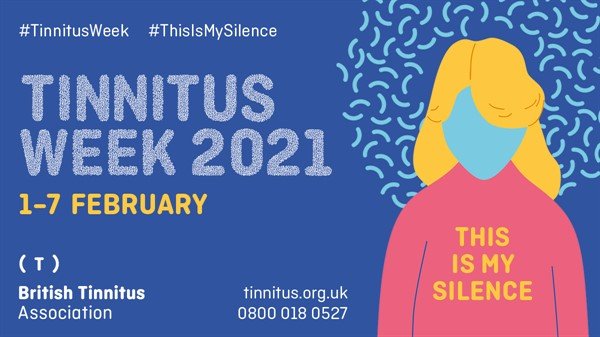Tinnitus is one of the possible after-effects of meningitis. It is reported by survivors of both bacterial and viral meningitis, and can be very difficult to live with. To mark Tinnitus Week (1-7 February 2021), we are delighted to share this guest post from the British Tinnitus Association.
What is tinnitus?
Tinnitus is the perception of hearing a sound in the ears and/or head in the absence of a matching external sound. Tinnitus can be any noise, but people often describe it as ringing, whooshing or buzzing in the ear. These sounds can be continuous or they can come and go.
Who gets tinnitus?
Tinnitus is very common and can affect people of all ages, even young children, although it is more common in older people and in people with hearing loss or other ear problems. About 30% of us will experience tinnitus at some point, and 13% (over 1 in 8) people live with persistent tinnitus.
The experience of tinnitus is very individual. Most people find they can continue their normal day-to-day activities. However, a small percentage of people with tinnitus report that it severely affects them.

Click here to learn more about Tinnitus Week.
What causes tinnitus?
Although we don’t know the exact answer to what causes tinnitus, we know that it is not a disease and that it is activity in the auditory (hearing) part of the brain and not the ear itself.
It is generally agreed that tinnitus results from some type of change to wellbeing, either mental or physical, not necessarily related to hearing. It could be due to hearing loss, damage caused by exposure to loud sounds or a change in stress levels, perhaps from a change in life circumstances.
People often say that they are aware of tinnitus when they have a cold, an ear infection or wax blocking the ear. Fortunately, tinnitus is rarely a sign of a serious health problem but it is still a good idea to see a doctor to rule any problems out.
What should I do?
If you are hearing tinnitus continually or regularly, or it is distressing you, speak to your GP. They will usually check your ears for infection or ear wax build up before referring you to a specialist. This will usually be to a tinnitus clinic within a hospital ENT or audiology department.
The most important thing to do is to keep doing the things you enjoy. You may need to do things differently, for example reading with some background music on, but try to lead your live as normal.
It does improve
Hearing tinnitus for the first time can be quite worrying and you may be very aware of this new sound and anxious about its implications. Like any new situation, there will be a period of adaption.
Most people find that their tinnitus does settle down over time, even without doing anything special. This is called
habituation. It’s a bit like walking into a room with a noisy ticking clock. Initially, it seems really loud and then after a while, you stop noticing it so much. Tinnitus can often be like this – initially, it’s intrusive but you gradually notice it less than you did.